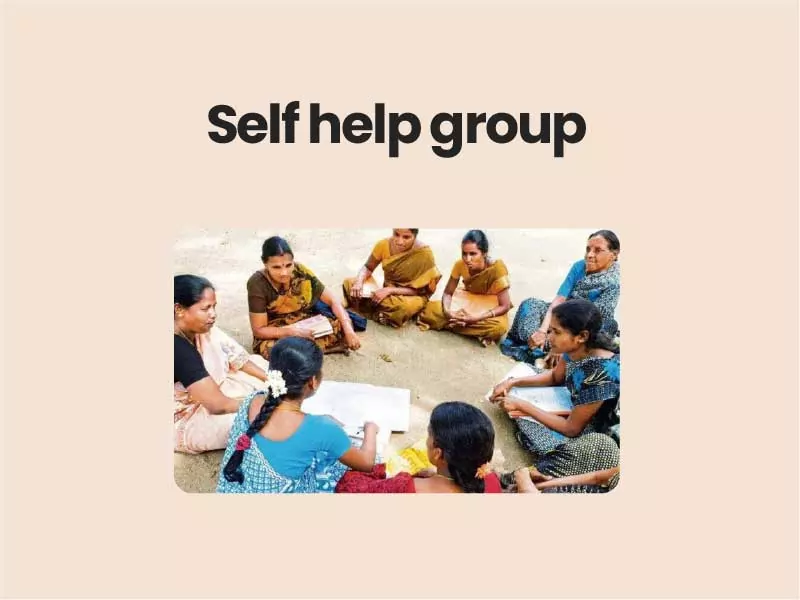Companion@360 → 7 Month programme to sharpen your writing skills → REGISTER NOW

Self-help group
Self Help Groups (SHGs) are small groups of poor people. The members of an SHG face similar problems. They help each other, to solve their problems.
SHGs promote small savings among their members. The savings are kept with the bank. This is the common fund in the name of the SHG.
SHG is an informal group and registration under any Societies Act, State cooperative Act or a partnership firm
A Self Help Group is defined as a “self-governed, peer controlled information group of people with a similar socio-economic background and having a desire to collectively perform a common purpose.”
Objectives
- To inculcate the savings and banking habits among members.
- To secure them from financial, technical and moral strengths.
- To enable availing of loan for productive purposes.
- To gain economic prosperity through loan/credit.
- To gain from collective wisdom in organising and managing their own finance and distributing the benefits among themselves.
- To sensitize women of the target area for the need of SHG and its relevance in their empowerment.
- To enhance the confidence and capabilities of women.
- To motivate women taking up social responsibilities particularly related to women development.
- It acts as the forum discussion.
SHG movement in India
- Formation of SHGs for savings and credit and their linkage to commercial banks was initiated in India by MYRADA (Mysore Resettlement and Development Agency), an NGO, in the mid-1980s.
- However, SHGs as a tool to address poverty became significant only when the Reserve Bank of India (RBI) issued a circular in 1992 to link about 500 groups under the NABARD-SHG bank linkage pilot program.
- This success has led to mainstreaming of SHGs into the financial landscape and especially the Indian banking system, with about 94 million poor linked with banks through 7.5 Million SHGs, availing them of collateral-free credit.
- As a part of the poverty alleviation measures, the Government of India launched the Swarnjayanti Gram Swarozgar Yojna (SGSY) in April 1999 where the major emphasis is on SHG formation, social mobilization and economic activation through micro-credit finance
- This success led to the genesis of a massive community mobilization initiative by the Government of India as National Rural Livelihoods Mission (NRLM) in 2011
Benefit of SHGs
- Social and financial inclusion
- Women empowerment and Gender Equity – SHGs empowers women and inculcates leadership skills among them. Empowered women participate more actively in gram sabha and elections.
- Pressure Groups – their participation in the governance process enables them to highlight issues such as dowry, alcoholism, the menace of open defecation, primary health care etc and impact policy decisions.
- Voice to marginalized section of the society.
- Improving the efficiency of government schemes and reducing corruption through social audits.
- Alternate source of employment – it eases dependency on agriculture by providing support in setting up micro-enterprises e.g. personalised business ventures like tailoring, grocery, and tool repair shops.
- Impact on Housing & Health – The financial inclusion attained through SHGs has led to reduced child mortality, improved maternal health and the ability of the poor to combat disease through better nutrition, housing and health – especially among women and children.
Read Also Poshan Abhiyaan
Challenges
- Lack of knowledge and proper training.
- Lack of supporting infrastructure and supporting facilities like credit, marketing facilities, etc
- Poor repayment of loans affecting making banks reluctant to lend further.
- Patriarchal mindset and Social stigma on women engaging in the public sphere
- Diversion of money for unproductive purposes
- Poor penetration of SFGs in high poverty states like UP, Bihar, etc
Case studies
Kudumbasree in Kerala: Since 1998 kudumbasree has played a crucial role in the socio-economic-political development of the state.
Pramila bisoi, a SHG worker from Odisha has won the 17th Lok sabha election.
